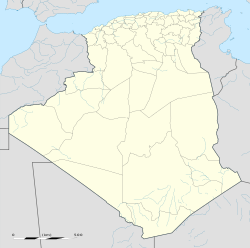Zuccabar
36°15′57″N 2°17′50″E / 36.26583°N 2.29722°E
Caesarea of Mauretania | |
| Location | Algeria |
|---|---|
| Region | Aïn Defla Province |
| Coordinates | 36°15′57″N 2°17′50″E / 36.265833°N 2.297222°E |
Zuccabar (or Zucchabar) was an ancient town in the Roman province of Mauretania Caesariensis. It is located in present-day Miliana, Algeria.
History
Zuccabar was constituted as a Roman colony (Colonia Iulia Augusta Zucchabar) under the Emperor Augustus.
Indeed, actual
Zuccabar belonged to the
Zucchabar became a Christian episcopal see in the fourth century. The names of two of its Catholic bishops and one Donatist are recorded:[9]
- Maximianus, who attended the Conference of Carthage (411);
- Germanus, the Donatist bishop who attended the same conference;
- Stephanus, one of the Catholic bishops whom a meeting in Carthage in February 484and then exiled.
The bishopric is included in the Catholic Church's list of titular sees.[10] In late antiquity it was an episcopal see that has been "born again" as a titular see of the Roman Catholic Church since 1967.
Miliana was (re)founded in the 10th century by Buluggin ibn Ziri on the site of the ancient Roman city of Zuccabar (or "Succhabar").
Trivia
In the movie Gladiator by Ridley Scott, Zucchabar is fictitiously introduced as the name of a Roman province (rather than a town), when Maximus is brought south of his homeland Hispania into an arid and desert land, after having been enslaved by merchants.[11] It is also in this province that he meets Proximo.[12][13]
Notes
- ^ a b Huß, Werner (Bamberg) (October 2006). "Succhabar". Brill's New Pauly.
- ^ a b Miliana ville historique Archived March 24, 2014, at the Wayback Machine
- ^ "Zucchabar: a Pleiades place resource". Pleiades: a gazetteer of past places. Retrieved 2018-02-01.
- ^ Ptolemy, Book 4, chapter 2 (page 95 in the translation by Edward Luther Stevenson (New York, 1932)) Archived March 24, 2014, at the Wayback Machine
- ^ a b Pliny, Natural Histories, book 5, chapter 1
- ^ Ammianus Marcellinus, Roman History, XXIX, V, 25 and 20
- ISBN 978-90-0426787-9), p. 179
- ^ George Sale, George Psalmanazar, Archibald Bower, George Shelvocke, John Campbell, John Swinton An Universal History, from the Earliest Account of Time (T. Osborne 1748), p. 313
- ^ Stefano Antonio Morcelli, Africa christiana, Volume I, Brescia 1816, p. 371
- ISBN 978-88-209-9070-1), p. 1013
- ISBN 9781317425878.
- ISBN 9780753547083.
- ISBN 9781118589816.
Bibliography
- Lawless, R. Mauretania Caesartiensis: archeological and geographical survey. Durham University. Durham, 1969 Zuccabar
- Lepelley, Claude. Rome et l'intégration de l'Empire, 44 av. J.-C. – 260 ap., T. 2, « Approches régionales du Haut-Empire romain », Nouvelles Clio, 1998
- Prevost, Virginie. Les dernières communautés chrétiennes autochthones d'Afrique du Nord". Armand Colin ed. (p. 461-483)
- Smith Reid, James. The Municipalities of the Roman Empire The University of Michigan Press. Chicago, 1913


